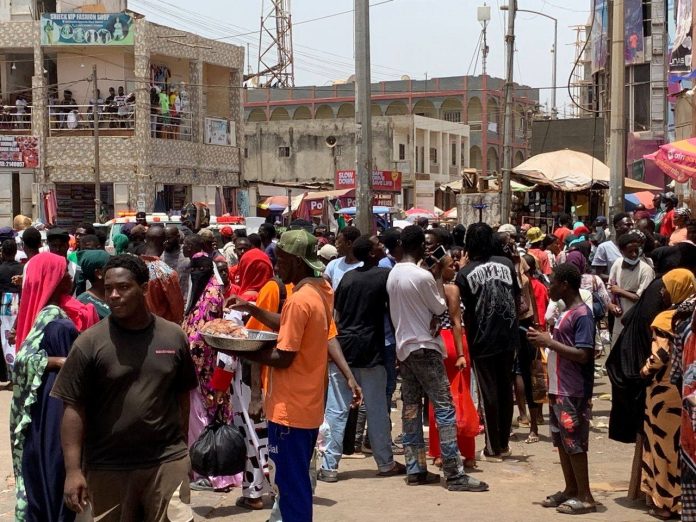In a move to restore order and ease market congestion, the Kanifing Municipal Council has officially banned the annual street sale event known as “Wanterr” in Serrekunda, sparking controversy among vendors and triggering heated protests in the lead-up to the Eid festivities.
The decision, conveyed by Sainey Sanayang, Deputy Commissioner of the Council’s Police Unit, came after escalating tensions between shopkeepers and informal street vendors, who traditionally line the roads during Wanterr to sell goods at discounted prices. Sanyang, also the Council’s chief of operations, cited security concerns, traffic obstruction, and mounting frustrations from shop owners as the key reasons behind the prohibition.
“This issue has been going on for a while,” Sanayang said, noting that recent clashes in the area had turned chaotic. “There was tension because they were stoning each other. In the interest of the general public, I said there won’t be Wanterr henceforward.”
According to Sanayang, market traders who operate year-round under license have voiced increasing grievances over the disruption caused by the temporary sellers. They complain of obstructed shopfronts, dwindling customer access, and unfair pricing competition from unregistered vendors.
“What they are saying is the hard truth,” he said. “We have to respect that and ensure that their businesses continue.”
The ban comes at a critical time for vendors relying on the Eid times for increased sales. Temporary traders have historically set up makeshift stalls along Serrekunda’s bustling market roads, offering clothing, shoes, and bags, among others, at lower rates than the fixed retail shops. The practice, however, has become a flashpoint in recent years.
Modou Ceesay, President of the Gambia Market Union and a key adviser to the Market Committee, acknowledged the legitimacy of the concerns from both sides. While sympathetic to the economic pressures facing informal vendors, Ceesay pointed to the availability of alternative market spaces.
“The market has empty spaces that people can use to do Wanterr,” he said. “But don’t allocate space on the roads and block access routes to the shops. You want them to pay, and yet you’re blocking access — how can they make sales?”
Ceesay further alleged that many of the Wanterr vendors were non-Gambians who import their goods from Senegal, suggesting that their operations do little to support the local economy. He also criticised elements within the council that he believes are financially benefiting from the disorder.
In a statement seeking to calm tensions, Mayor Talib Bensouda underscored the need for a peaceful resolution. He thanked the Municipal and Gambia Police for intervening to defuse the situation and announced that space would be allocated within the market to accommodate up to 200 temporary vendors.
“I urge all vendors in and out of the market to cease any act of violence or willful damage to property,” he said. “The streets around the market serve as a lifeline; if those are clogged by Wanterr vendors, it suffocates the market and poses a security risk.”
Despite the overtures, protests continued as licensed vendors — including women shopkeepers — voiced strong objections to the continued presence of street vendors doing “Wanterr”. These women emphasised that they were not part of the Wanterr sales but were directly affected by them. Many said they are struggling to stay afloat in a marketplace where access to their shops is regularly obstructed during festive periods.
“We sit the whole day and sometimes don’t even have ten customers,” one vendor said. “How can we survive when people can’t even get to our shops?”
They stressed that Wanterr was never their initiative but has become a source of economic disruption. “We are not allowing Wanterr to continue,” a group of female vendors said during a demonstration. “We own shops, we pay our dues. Yet, we are the ones suffering because our customers can’t reach us.”
Vendors accused the market committee of overstaying its mandate and failing to act in the interests of shop owners. Some described the committee as unaccountable and indifferent to their plight.
“The committee is selfish and not serving the interest of the vendors,” said Jarga Camara, one of the protestors.
While the Council maintains that the ban is a necessary step to ensure safety and protect formal business interests, it remains to be seen how effective enforcement will be — and whether displaced vendors will find acceptable alternatives before the peak of the festive shopping season. Meanwhile, the licensed shop owners, many of them women, say they are simply demanding the right to conduct business without obstruction or unfair competition. Foroyaa is monitoring.


















